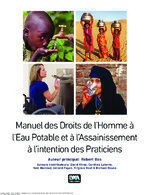Manuel des Droits de l'Homme à l'Eau Potable et à l'Assainissement à l’intention des Praticiens
| dc.contributor.author | Bos, Robert | |
| dc.date.accessioned | 2019-08-13 08:41:37 | |
| dc.date.accessioned | 2020-04-01T10:10:58Z | |
| dc.date.available | 2020-04-01T10:10:58Z | |
| dc.date.issued | 2018 | |
| dc.identifier | 1005277 | |
| dc.identifier | OCN: 1054084349 | en_US |
| dc.identifier.uri | http://library.oapen.org/handle/20.500.12657/24827 | |
| dc.description.abstract | "Manuel des Droits de l'Homme et à l'Eau Potable et à l'Assainissement à l’intention des Praticiens is the French translation of Manual on the Human Rights to Safe Drinking Water and Sanitation for Practitioners. The Manual highlights the human rights principles and criteria in relation to drinking water and sanitation. It explains the international legal obligations in terms of operational policies and practice that will support the progressive realisation of universal access. The Manual introduces a human rights perspective that will add value to informed decision making in the daily routine of operators, managers and regulators. It also encourages its readership to engage actively in national dialogues where the human rights to safe drinking water and sanitation are translated into national and local policies, laws and regulations. Creating such an enabling environment is, in fact, only the first step in the process towards progressive realisation. Allocation of roles and responsibilities is the next step, in an updated institutional and operational set up that helps apply a human rights lens to the process of reviewing and revising the essential functions of operators, service providers and regulators. Contents Introduction; Main operational principles; Setting the scene – context and contents of the human rights to safe drinking water and sanitation; Translating the human rights to safe drinking water and sanitation into operational terms; Creating the enabling environment; . Incorporating HRWS into the essential functions of service providers; Addressing sensitive practices, dealing with challenges and avoiding pitfalls." | |
| dc.language | French | |
| dc.subject.classification | thema EDItEUR::P Mathematics and Science::PD Science: general issues::PDG Industrial applications of scientific research and technological innovation | en_US |
| dc.subject.classification | thema EDItEUR::T Technology, Engineering, Agriculture, Industrial processes::TQ Environmental science, engineering and technology::TQS Sanitary and municipal engineering::TQSW Water supply and treatment | en_US |
| dc.subject.other | water | |
| dc.subject.other | policy | |
| dc.subject.other | governance | |
| dc.subject.other | health | |
| dc.subject.other | developing countries | |
| dc.subject.other | clean water | |
| dc.subject.other | drinking water | |
| dc.subject.other | manual | |
| dc.title | Manuel des Droits de l'Homme à l'Eau Potable et à l'Assainissement à l’intention des Praticiens | |
| dc.type | book | |
| oapen.abstract.otherlanguage | " Le Manuel des Droits de l'Homme et à l'Eau Potable et à l'Assainissement à l’intention des Praticiens vise à: Introduire les principes et concepts contenus dans les résolutions des Nations Unies reconnaissant le Droit de l’Homme à l’Eau Potable et à l’Assainissement (DHEA) Clarifier le langage et la terminologie utilisés dans la promotion des droits de l’homme, et Fournir des conseils sur les rôles et les responsabilités de tous ceux qui contribuent à la réalisation progressive des DHEA, et sur la façon dont les principes et les actions en matière de droits humains peuvent être incorporés dans leurs fonctions essentielles. Le Manuel met en lumière les principes et critères relatifs aux droits de l’homme dans le domaine de l’eau potable et de l’assainissement. Il explique les obligations juridiques internationales en termes de politiques et de pratiques opérationnelles qui soutiendront la réalisation progressive de l’accès universel. Le Manuel introduit une perspective des droits de l’homme qui ajoutera de la valeur à la prise de décision éclairée dans les activités quotidiennes des opérateurs, des gestionnaires et des organismes de régulation. Il encourage également ses lecteurs à s’engager activement dans des dialogues nationaux pour que les droits de l’homme à l’eau potable et à l’assainissement soient traduits en politiques, lois et règlements nationaux et locaux. La création d’un tel environnement favorable n’est, en fait, que la première étape du processus de réalisation progressive. La répartition des rôles et des responsabilités est l’étape suivante, dans un cadre institutionnel et opérationnel actualisé qui permet d’appliquer une perspective des droits de l’homme au processus d’examen et de révision des fonctions essentielles des opérateurs, des prestataires de services et des organismes de régulation." | |
| oapen.identifier.doi | 10.2166/9781789060065 | |
| oapen.relation.isPublishedBy | dc3cfe72-8424-48e6-b8e0-fca2844ba38e | |
| oapen.relation.isbn | 9781789060065 | |
| oapen.identifier.ocn | 1054084349 |

